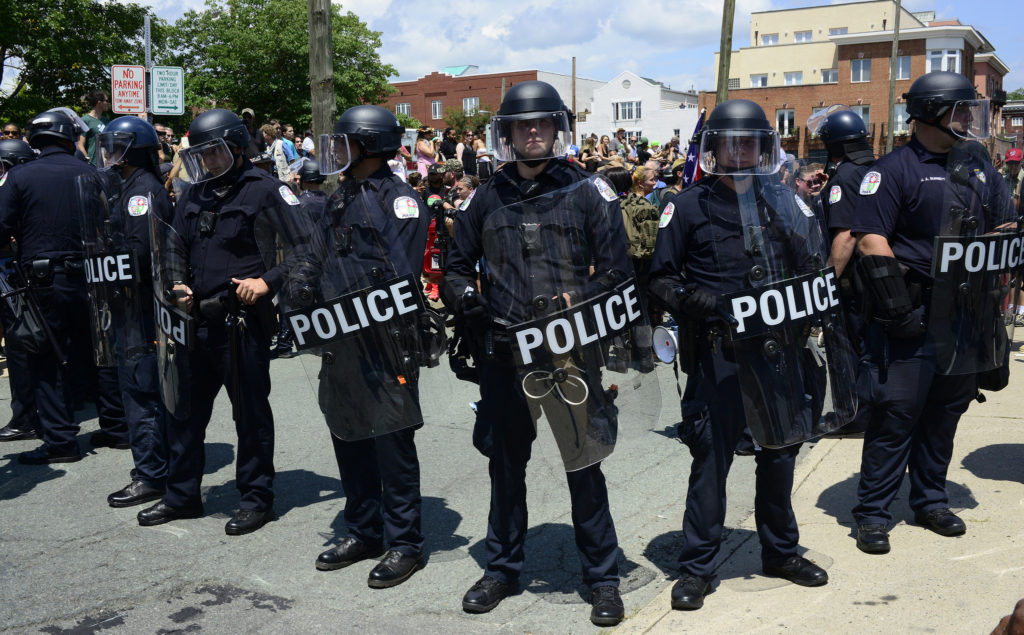After the violent rally in Charlottesville in August, Virginia Attorney General Mark Herring (D) and Delegate Marcia Price (D-95) have filed legislation to make domestic terrorism a state crime and make it illegal for citizens with ties to domestic terrorism groups to conduct a meeting. According to the Daily Press, the Office of the Attorney General has been crafting a bill since the August 12 white supremacy rally. Amid the chaos of the rally, Heather Heyer was killed after she was hit by a fleeing car driven by a member sympathetic to white supremacists.
House Bill 1601 will require the superintendent of the Virginia State Police to identify active domestic terrorist organizations in the commonwealth and list them in an annually-published state agency document, the Virginia Register of Regulations. Moreover, the bill will define domestic terrorism, taking similar language from state hate crime laws.
According to Price’s bill, domestic terrorism group is defined as:
“Domestic terrorist organization” means any organization, association, or group of three or more persons, whether formal or informal, which has an identifiable name or identifying sign or symbol and either (i) has as one of its primary objectives or activities an act of domestic terrorism; or (ii) whose members individually or collectively have engaged in the commission of, attempt to commit, conspiracy to commit, or solicitation of two or more acts of domestic terrorism, provided such acts were not part of a common act or transaction.
The bill focuses on groups and not individuals. The domestic terrorism group’s main prerogative would be to enact terrorism, or have members who have attempted to commit two or more acts of domestic terrorism on their own or with others.
In defining acts of domestic terrorism, the bill is stricter than state hate crime laws. With Virginia’s hate crime laws, language about gender, sexual orientation, or disabilities is not specified.
“Act of domestic terrorism” means (i) an act of violence…committed against a person or his property with the intent of instilling fear or intimidation in the individual against whom the act is perpetrated because of race, religion, national origin, gender, sexual orientation, or disability, or that is committed against such person for the purpose of restraining that person from exercising his rights under the Constitution or laws of this Commonwealth or of the United States.”
If someone is charged under the new law by participating in a domestic terrorist organization or carrying out a violent act under the group, they would face up to 10 years prison after being convicted of a Class 5 felony. The legislation would also make it a Class 5 felony to knowingly provide resources or materiel support to a domestic terrorist group. If an individual is killed as a result of the acts committed by the specific group, the penalty would increase via a Class 2 felony with life imprisonment.
According to the language of the bill, if three or more individuals of a certain domestic terrorism organization meet, “with the intent of advancing some unlawful goal, mission or purpose of the domestic terrorist organization,” all would face up to one year in prison after being charged with a Class 1 misdemeanor. Moreover, having a firearm or any other “deadly or dangerous weapon” at a meeting would result in a Class 5 felony.
The bill, however, raises a few constitutional concerns from scholars. University of Richmond law professor Carl Tobias claims a state regulation may get in the way of the federal crime. “I’m mildly suspicious of it,” Tobias said. “People can assemble. We don’t want them to do nefarious things, but isn’t that the federal government is supposed to watch for?”
Michael Kelly, a spokesman for the Attorney General’s Office, said the bill will not conflict with an citizen’s constitutional right to peacefully assemble. The bill target groups that Virginia Register of Regulations lists as domestic terrorism organizations. H.B. 1601 is modeled after current laws that have barred recruitment in street gangs such as MS-13. Though, the state code does not make it illegal for three or more gang members to meet. Thus, the questions of intent of a group arise.
If a group is labeled as a domestic terrorism organization, they are allowed to seek judicial review in the Richmond Circuit Court within 30 days of the state agency guide being published. Since the reports may, “likely contain sensitive intelligence or investigative information that would best be kept confidential,” according to Kelly, the Virginia State Police can withhold them from the public.

